Is Cabbage Keto Friendly? A Clear Answer with Expert Insight
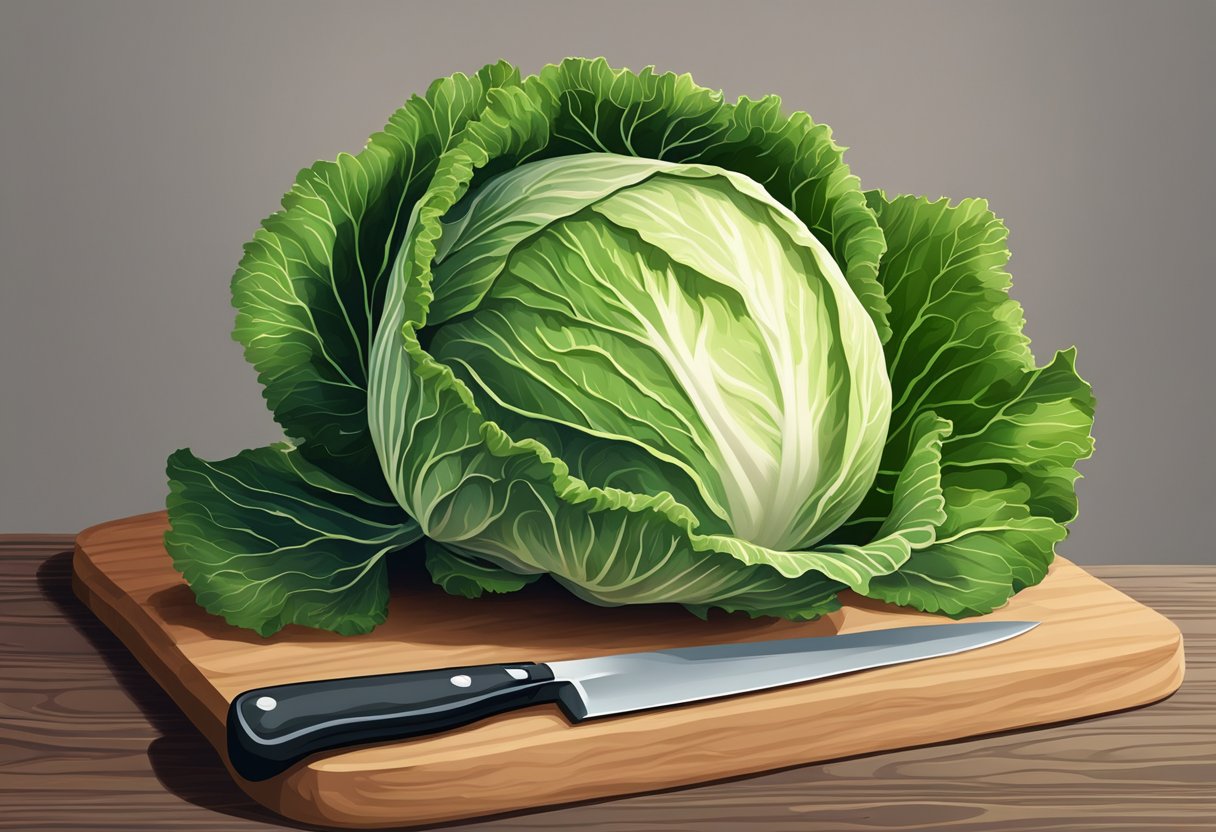
Cabbage is a popular vegetable that is commonly used in a variety of dishes around the world. However, with the rise of the ketogenic diet, many people are wondering whether cabbage is keto-friendly or not. The ketogenic diet is a high-fat, low-carb diet that aims to put the body into a state of ketosis, where it burns fat for energy instead of carbohydrates.
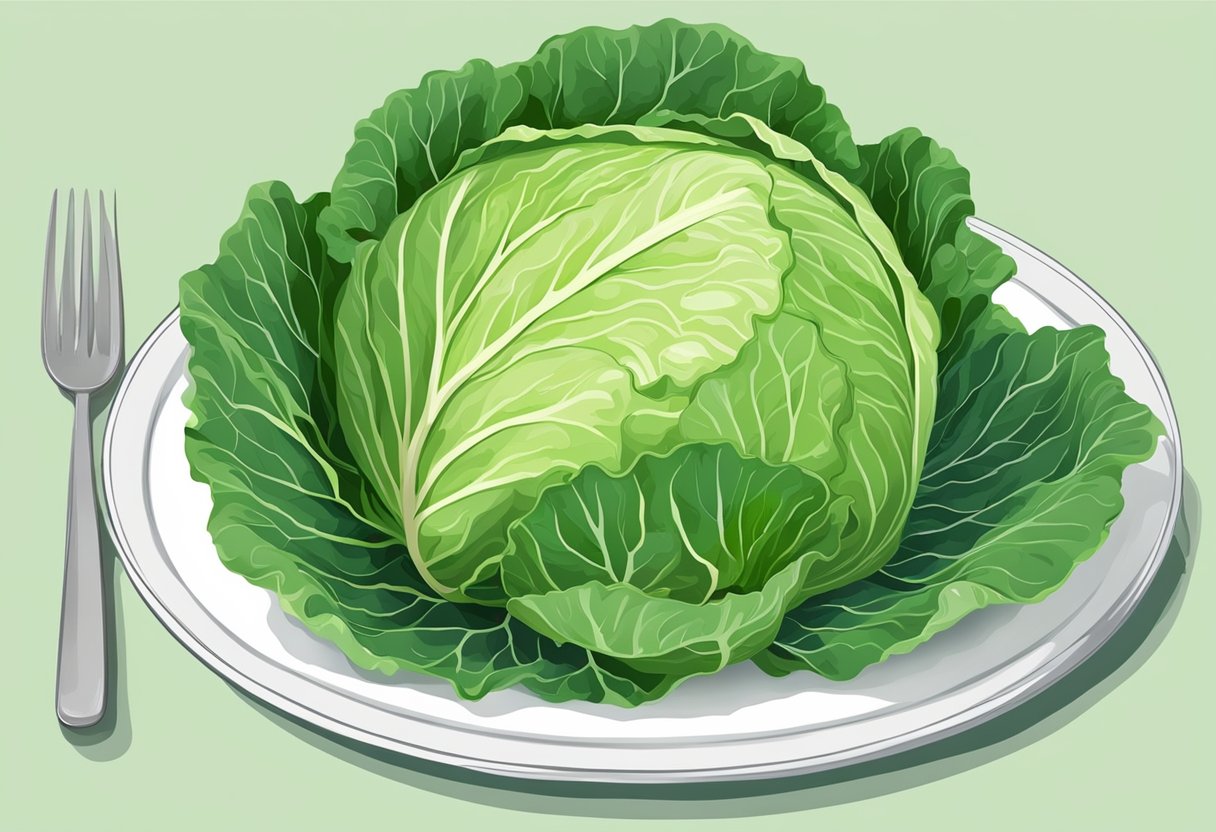
Cabbage is a low-carb vegetable that is high in fiber, making it a great choice for those following the ketogenic diet. One cup of chopped cabbage contains only 2.2 grams of net carbs, which is well within the recommended daily limit for those following the diet. Additionally, cabbage is rich in vitamins and minerals, including vitamin C, vitamin K, and potassium, making it a nutritious addition to any meal.
While cabbage is generally considered to be keto-friendly, it is important to note that the way it is prepared can affect its carb count. For example, cabbage rolls that are filled with rice or other high-carb ingredients may not be suitable for those following the ketogenic diet. Overall, cabbage is a versatile and nutritious vegetable that can be enjoyed by those following the ketogenic diet in a variety of ways.
Understanding Keto Diet
The keto diet, also known as the ketogenic diet, is a low-carb, high-fat diet that has gained popularity in recent years due to its potential to aid in weight loss. The diet is designed to put the body into a state of ketosis, where it burns fat instead of carbohydrates for energy.
The basic principle behind the keto diet is to restrict carbohydrates, increase fat intake, and moderate protein intake. By doing so, the body is forced to use fat as its primary source of fuel, which can lead to weight loss.
Carbohydrates are limited to a certain number of grams per day, typically around 20-50 grams. This is because carbs are converted into glucose, which raises insulin levels and can prevent the body from entering ketosis.
Protein intake is also moderated on the keto diet, as too much protein can also raise insulin levels and prevent ketosis. Fat, on the other hand, is encouraged on the keto diet, as it is the primary source of energy for the body in the absence of carbohydrates.
It is important to note that not all fats are created equal, and the keto diet emphasizes healthy fats such as avocados, nuts, and olive oil, while limiting unhealthy fats such as trans fats.
Net carbs, which are calculated by subtracting fiber from total carbohydrates, are also important on the keto diet. This is because fiber does not raise insulin levels and does not contribute to the body’s carbohydrate count.
Overall, the keto diet can be an effective way to lose weight and improve overall health when followed correctly. However, it is important to consult with a healthcare professional before starting any new diet or exercise program.
Is Cabbage Keto Friendly?
https://www.youtube.com/watch?v=7Pg7IrP4OWM&embed=true
Cabbage is a popular vegetable that is low in carbs and calories, making it a great choice for those following a keto diet. There are several varieties of cabbage, including green cabbage, red cabbage, Napa cabbage, purple cabbage, Chinese cabbage, Savoy cabbage, and bok choy.
One cup of chopped green cabbage contains only 2.3 grams of net carbs, making it an excellent choice for those on a keto diet. Red cabbage is also low in carbs, with one cup of chopped red cabbage containing only 4 grams of net carbs.
Napa cabbage, also known as Chinese cabbage, is a popular ingredient in Asian cuisine. One cup of chopped Napa cabbage contains only 1.2 grams of net carbs, making it an excellent choice for those on a keto diet.
Purple cabbage, also known as red cabbage, is another low-carb option, with one cup of chopped purple cabbage containing only 3.9 grams of net carbs. Savoy cabbage is also low in carbs, with one cup of chopped Savoy cabbage containing only 2.2 grams of net carbs.
Bok choy is a type of Chinese cabbage that is commonly used in stir-fries and soups. One cup of chopped bok choy contains only 0.8 grams of net carbs, making it an excellent choice for those on a keto diet.
In summary, cabbage and its various varieties are low in carbs and calories, making them a great choice for those following a keto diet. Incorporating cabbage into your meals can help you stay within your daily carb limit while still enjoying a variety of delicious and nutritious foods.
Nutritional Value of Cabbage
https://www.youtube.com/watch?v=aRuY09gkMXA&embed=true
Cabbage is a highly nutritious vegetable that is low in calories and high in fiber. It is an excellent source of vitamin C, vitamin K, and vitamin B6, as well as minerals such as calcium, iron, and magnesium. Additionally, cabbage contains antioxidants and other micronutrients that are beneficial for overall health.
One cup of chopped raw cabbage contains approximately 22 calories, 5 grams of carbohydrates, 2 grams of fiber, and 1 gram of protein. It is also a good source of vitamin C, providing 54% of the recommended daily intake. Vitamin C is an essential nutrient that helps boost the immune system and supports collagen production, which is important for healthy skin, bones, and joints.
Cabbage is also high in fiber, which helps regulate digestion and promotes feelings of fullness. One cup of cabbage provides 2 grams of fiber, or 8% of the recommended daily intake. Fiber is important for maintaining a healthy weight and reducing the risk of chronic diseases such as heart disease and diabetes.
In addition to vitamin C and fiber, cabbage is a good source of calcium, iron, and magnesium. Calcium is important for strong bones and teeth, while iron is essential for healthy blood and oxygen transport throughout the body. Magnesium is important for muscle and nerve function, as well as regulating blood pressure.
Cabbage also contains other micronutrients such as vitamin B6 and vitamin E, which are important for overall health. Vitamin B6 is involved in many metabolic processes, including protein metabolism and neurotransmitter synthesis. Vitamin E is an antioxidant that helps protect cells from damage caused by free radicals.
Overall, cabbage is a highly nutritious vegetable that is low in calories and high in fiber, vitamins, and minerals. It is a great addition to any healthy diet and can be enjoyed in a variety of dishes, from salads to stir-fries.
Health Benefits of Cabbage
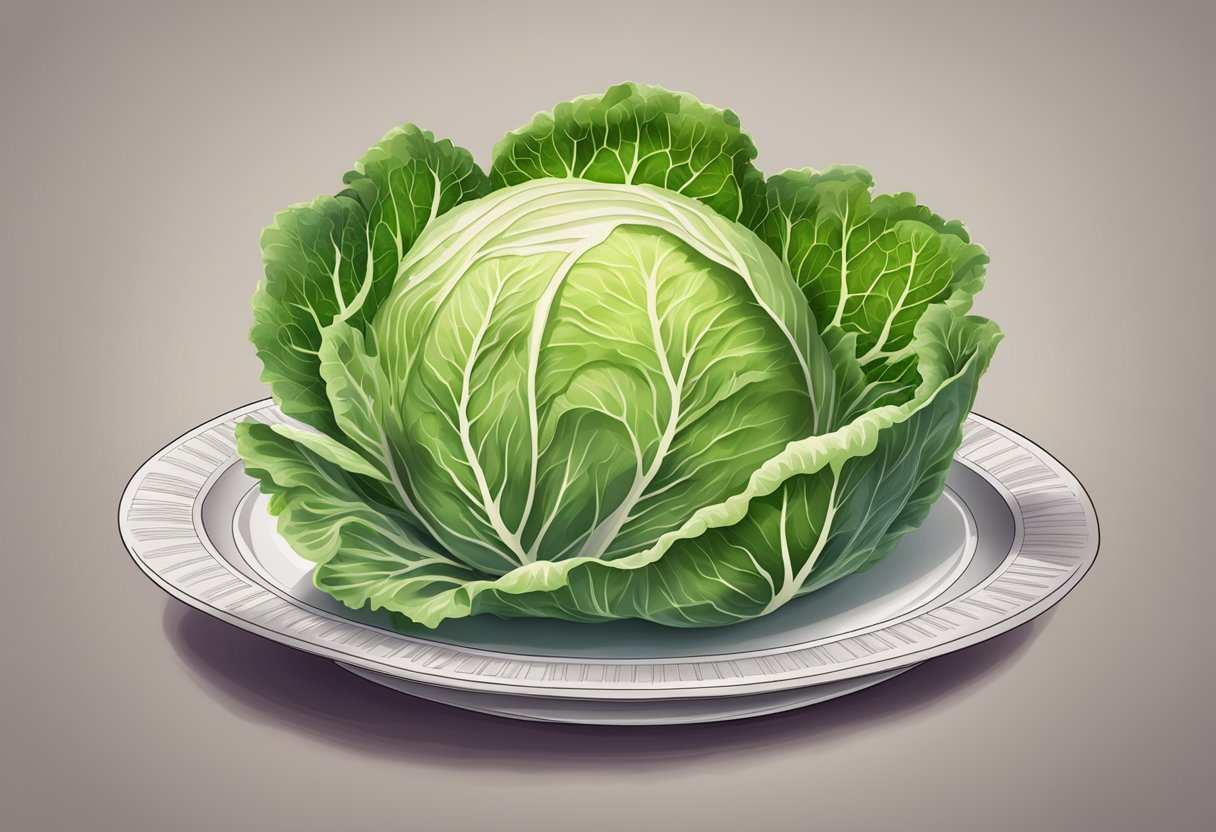
Cabbage is a low-carbohydrate vegetable that is often used in keto diets. It is a cruciferous vegetable that is packed with nutrients and has several health benefits.
Anti-Inflammatory Properties
Cabbage is rich in antioxidants and anti-inflammatory compounds that can help reduce inflammation in the body. Chronic inflammation has been linked to several diseases, including heart disease, cancer, and diabetes.
Promotes Digestive Health
Cabbage contains probiotics that can help improve gut health. These probiotics can help improve digestion and reduce the risk of digestive disorders. Additionally, cabbage is rich in fiber, which can help promote regular bowel movements and reduce the risk of constipation.
Lowers Risk of Cancer
Cabbage is rich in compounds that have been shown to have anti-cancer properties. These compounds can help prevent the growth and spread of cancer cells. Additionally, cabbage contains sulforaphane, a compound that has been shown to have anti-cancer properties.
Reduces Gas and Bloating
Cabbage contains compounds that can help reduce gas and bloating. These compounds can help improve digestion and reduce the risk of digestive disorders.
In conclusion, cabbage is a nutrient-dense vegetable that has several health benefits. It is rich in antioxidants, anti-inflammatory compounds, probiotics, and fiber. Additionally, cabbage has been shown to have anti-cancer properties and can help reduce gas and bloating.
Cabbage in Keto Recipes
Cabbage is a versatile vegetable that can be used in many keto recipes. It is low in carbs and high in fiber, making it an excellent choice for those following a ketogenic diet. Here are some delicious ways to incorporate cabbage into your keto meals:
Cabbage Rolls
Cabbage rolls are a classic dish that can be made keto-friendly by using cabbage leaves instead of traditional pasta. Simply blanch the cabbage leaves to make them pliable, then stuff them with your favorite keto-friendly filling, such as ground beef, pork, or turkey. Bake the cabbage rolls in a tomato sauce for a comforting and satisfying meal.
Southern Fried Cabbage
Southern fried cabbage is a flavorful side dish that can be made keto-friendly by using bacon or sausage instead of traditional ham hocks. Fry the cabbage in the rendered fat until it is tender and crispy, then season with salt, pepper, and garlic powder for a delicious and satisfying side dish.
Coleslaw
Coleslaw is a refreshing side dish that can be made keto-friendly by using a sugar-free dressing. Mix shredded cabbage with mayonnaise, apple cider vinegar, and your favorite keto-friendly sweetener, such as stevia or erythritol. Add some shredded carrots and celery for extra crunch and flavor.
Egg Roll in a Bowl
Egg roll in a bowl is a popular keto recipe that uses cabbage as the base. Fry ground pork or turkey with shredded cabbage, onions, garlic, and ginger, then season with soy sauce and sesame oil for an Asian-inspired dish. Top with green onions and sesame seeds for extra flavor and texture.
Cabbage Hash Browns
Cabbage hash browns are a delicious and keto-friendly alternative to traditional potato hash browns. Shred cabbage and mix with eggs, almond flour, and your favorite seasonings, such as garlic powder and paprika. Fry in coconut oil until crispy and golden brown for a satisfying breakfast or brunch dish.
Stir-Fries
Cabbage is a great addition to stir-fries, adding crunch and texture to the dish. Fry cabbage with your favorite protein, such as chicken, beef, or shrimp, and add some low-carb vegetables, such as bell peppers and mushrooms. Season with soy sauce, ginger, and garlic for a flavorful and satisfying meal.
Overall, cabbage is a versatile and keto-friendly vegetable that can be used in many delicious recipes. Try incorporating it into your meals for added fiber and nutrition.
Comparing Cabbage to Other Vegetables
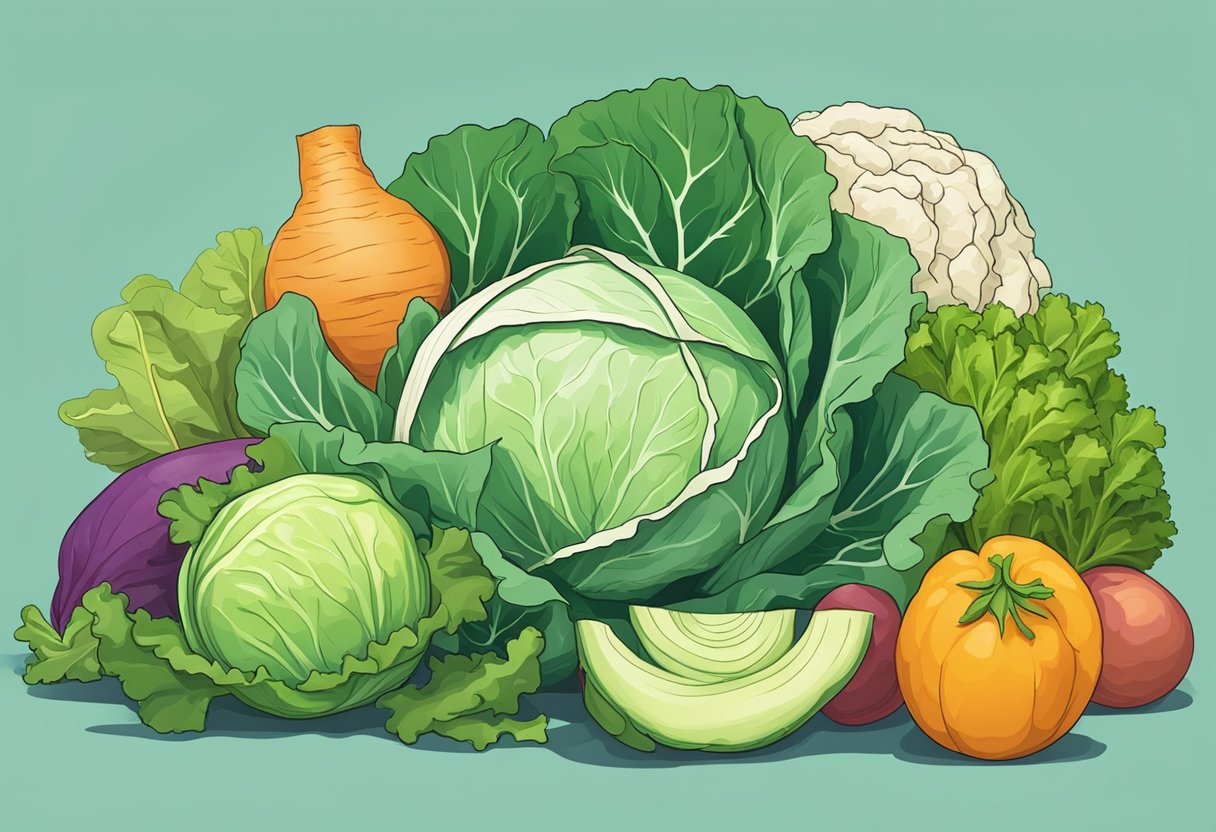
When it comes to keto-friendly vegetables, cabbage is often a popular choice due to its low carb content. However, how does it compare to other vegetables in terms of its nutritional value and carb count?
Broccoli is another cruciferous vegetable that is often included in keto diets. It contains slightly fewer carbs than cabbage, with 3.6g of net carbs per 100g compared to cabbage’s 3.8g. However, broccoli is higher in fiber, which can help with digestion and keeping you feeling full.
Spinach and kale are both leafy greens that are low in carbs and high in nutrients. Spinach has only 1.4g of net carbs per 100g, while kale has 3.6g. Both are great sources of vitamins and minerals, including vitamin K, iron, and calcium.
Brussels sprouts are another cruciferous vegetable that are similar in carb count to cabbage, with 3.9g of net carbs per 100g. They are also high in fiber and vitamin C.
Tomatoes are a non-cruciferous vegetable that are often used in keto diets due to their low carb content. They contain 2.7g of net carbs per 100g, making them lower in carbs than cabbage. They are also a good source of vitamin C and antioxidants.
Overall, while cabbage may not be the lowest carb vegetable out there, it is still a great option for those following a keto diet. Its versatility and nutritional value make it a valuable addition to any meal plan.
Fermented Cabbage: Sauerkraut and Kimchi

Fermented cabbage is a popular food choice for those following a keto diet. Sauerkraut and kimchi are two well-known examples of fermented cabbage that are both keto-friendly.
Sauerkraut is made by fermenting shredded cabbage with salt and other seasonings. The fermentation process allows beneficial bacteria to grow, which can aid in digestion and support a healthy gut microbiome. Sauerkraut is also a good source of vitamin C and K.
Kimchi is a traditional Korean dish made from fermented cabbage and other vegetables. It typically contains garlic, ginger, and chili peppers for added flavor and health benefits. Kimchi is also a good source of probiotics, which can improve digestive health and boost the immune system.
Both sauerkraut and kimchi are low in carbs and high in fiber, making them a great addition to a keto diet. They can be enjoyed as a side dish or added to salads, soups, and stir-fries for extra flavor and nutrition.
It’s important to note that not all store-bought sauerkraut and kimchi are created equal. Some brands may contain added sugars or other ingredients that are not keto-friendly. When purchasing fermented cabbage products, it’s best to read the labels carefully and choose options that are free from added sugars and other unnecessary additives.
Overall, fermented cabbage is a great keto-friendly food choice that can provide numerous health benefits. Incorporating sauerkraut and kimchi into a keto diet can help support a healthy gut and provide essential vitamins and minerals.
Cabbage and Protein Sources
Cabbage is a low-carb vegetable that is often used in keto diets due to its high fiber and low net carb content. However, it is important to pair cabbage with protein sources to create a well-balanced meal that will keep you full and satisfied.
When it comes to protein sources, chicken and pork are both great options to pair with cabbage. Chicken is a lean protein that is low in fat and high in protein, making it an ideal choice for those on a keto diet. Pork is also a good choice, as long as you opt for lean cuts such as pork loin or tenderloin.
Salmon is another protein source that pairs well with cabbage. It is a fatty fish that is high in omega-3 fatty acids, which are important for heart health. Salmon also contains high-quality protein, making it a great choice for those on a keto diet.
Eggs are a versatile protein source that can be paired with cabbage in a variety of ways. Whether you prefer scrambled, fried, or boiled eggs, they are a great way to add protein and healthy fats to your meal.
In general, it is important to choose protein sources that are low in carbs and high in fat and protein when pairing them with cabbage. This will help you maintain a state of ketosis and keep you feeling full and satisfied throughout the day.
Conclusion
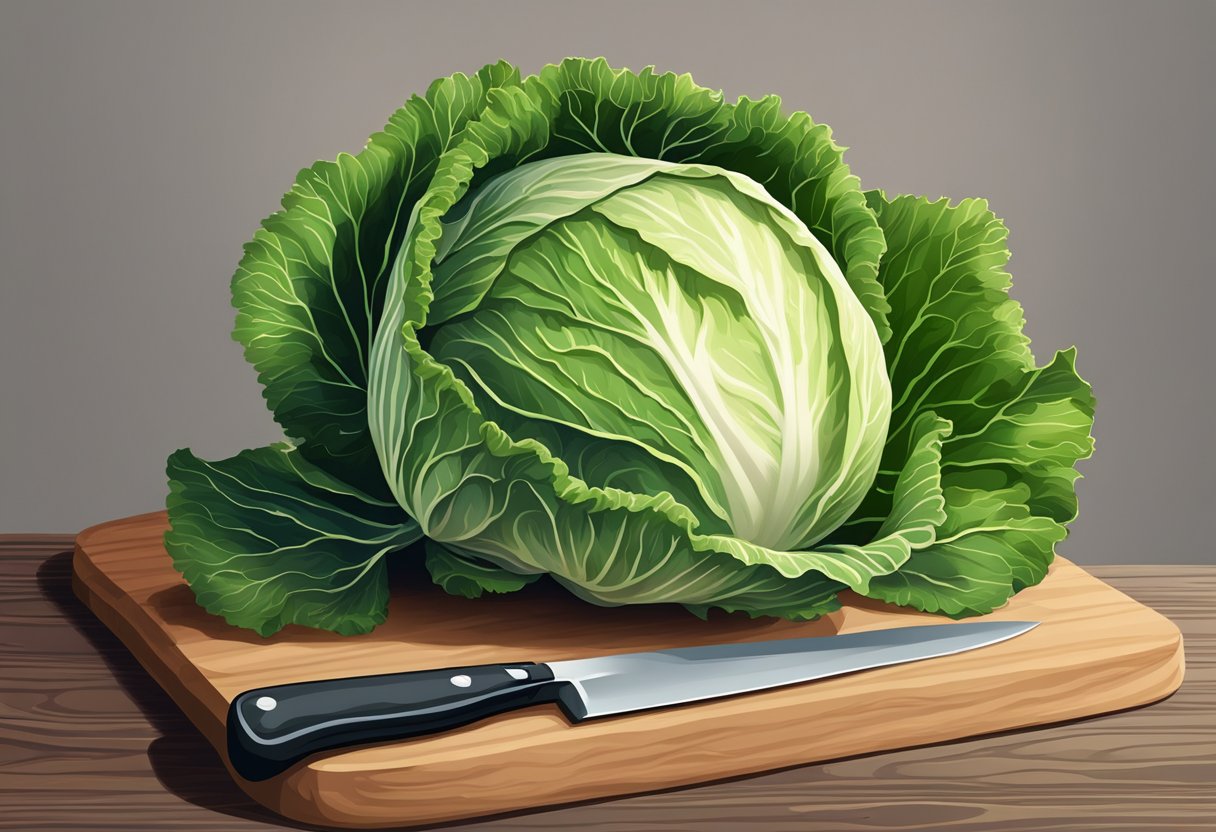
In conclusion, cabbage can be a great addition to a keto diet due to its low carb content and numerous health benefits. Cabbage is a versatile vegetable that can be used in a variety of dishes, making it easy to incorporate into a keto meal plan.
Cabbage is also known for its weight loss benefits, as it is low in calories and high in fiber. It can help you feel full and satisfied while also aiding in digestion.
Furthermore, cabbage is packed with vitamins and minerals, including vitamin C, vitamin K, and potassium. It also contains antioxidants that can help protect against chronic diseases.
Overall, cabbage is a nutritious and keto-friendly vegetable that can be a great addition to a healthy diet.








Leave a Reply